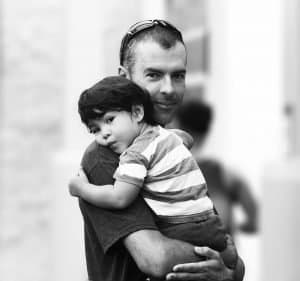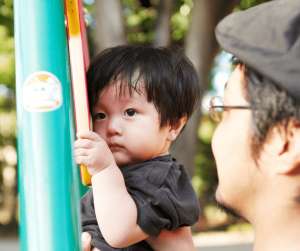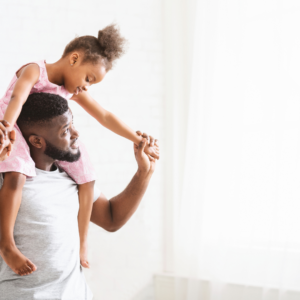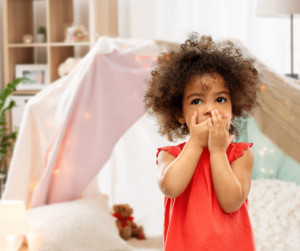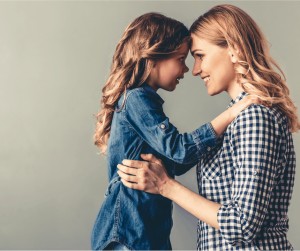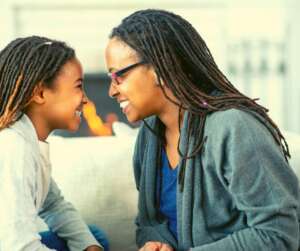Although I'd heard this day was coming, today was the first time my daughter said, “I don’t love you, Mommy. In fact, I don’t even like you.”
She’s eight. I knew this moment was inevitable. In an odd way, I craved it, if only for the sake of wanting to get it over with. It’s one of those awful rites of passage that parents almost invariably go through -- along with that fateful and heartbreaking transition from "Mommy" to "Mom," and watching our children get older faster than anyone could’ve possibly explained that they would.
The passage of time through the lens of parenting is an unfathomable thing.
And now, today, she’s old enough to utter those painful words.
“I don’t love you, Mommy. In fact, I don’t even like you.”
She’s able to feel those words deeply in her soul (at least
in that moment) and communicate them with the unrelenting
honesty that only a child can convey. These are the words that shift and stir things in our parenting hearts, making us wonder if we’re going to be okay. “We” as a parent/child unit -- will we
heal from this and be stronger, or did we create an emotional chasm that’s too deep to fill? And for me, will I heal and forgive myself for what made her feel the pain behind these words?
In these moments, we wonder if these will be our children’s memories of us someday. Dear God, I hope not.
Here’s the thing. One of my job titles is “Master Trainer” for a global conscious parenting organization where I train adults how to have connection-based relationships with their children. In my work every day, I help people create more peace in their families.
This moment was not peaceful. In fact, it hurt terribly. Cue imposter syndrome.
Also: cue being human. Humans feel things.
My soul ached; its virginal hopes of somehow magically being an “exception” to many of these tough moments had just been blown to smithereens.
My daughter was upset because I was
upholding a boundary that I’d failed to explain ahead of time. I was feeling frazzled about something else at the time. My emotional discombobulation came out harshly to her sensitive soul. In hindsight, I certainly didn’t express the boundary with nearly as much empathy as I should have.
There’s more to the story, though. She’d been crying big, heavy tears as she’d said those words. As they fell down her still baby-soft cheeks, she was on my lap -- her “safe place” throughout her life -- telling me what an awful thing she thought I’d done.
She also wanted me to read her a story.
“Why would you want a story from me now,” I asked, “while you’re so mad at me?”
“Because you’re more comfortable than Daddy, and no one else understands me the way that you do.” (I knew the answer. She wanted to
co-regulate with me. My tender heart asked that question before my brain could intercept it.)
In that moment, I realized she still feels safe here. These “I don’t love you” words are big ones, but she’s secure enough in my love for her that she feels safe to say them. She’s still coming to me. She’s not shutting me out. This is her way of giving me a strong message about her normal big feelings. That’s all. She’s human, too.
Her words aren’t the full story. If I were looking from above, I’d see a sad little girl saying something many times her size -- words that are foreign to her tender lips -- yet she’s saying them in the safest place she knows. She’s pouring her heart out to me. My job is to look for the underlying message. I get to translate her unmet needs; her pain; her sorrow -- into something we can solve together. This is, despite appearances, a great moment of connection.
Her words, of course, still went straight to my heart. Her tears invited some of mine to join them, and I felt their sad, healing warmth on my cheeks. My tears. Her tears. Intermingled, connected, soothing and mourning and hurt together -- healing.
A part of me, of course, heard a tired old narrative play in the back of my mind about “You don’t get to talk to Mommy that way,” along with a chorus of “You hurt Mommy’s feelings.”
Fortunately, something stronger than myself reminded me that shaming her and making her feel smaller with those -- lies, that’s what they are, just lies -- those are not the ways to show her that my lap is still her safe place.
The truth is that she does get to talk to me that way.
She gets to be honest with me. She gets to be authentic with me and say how she’s really feeling in the moment. That moment. Tomorrow’s moments. All the moments.
Beneath them all, what she's really asking is, "Do you still love me even when we struggle? Are we bigger than this?"
Just keep coming to my lap, baby. My lap is your safe place. You can say all the things and my job is to listen and love you through it.
I get to model for her that unconditional love means “I love you.” Period. Not just when you say or behave a certain way. My love is just here for you, like an endless source of water to quench your thirst; to give you relief and cleansing and hope. It’s reliable like the sky and the ground beneath our feet. It’s unchanging, at least as long as I breathe these words on this version of Earth.
The words that came out of my mouth were simple. “I love you. I’m here for you no matter what. Your anger is safe here. Your sadness is safe here. You are safe here.”
She handed me the book we’re reading together and sat rigidly on my lap while I started to read to her; our ever-present source of finding calm together.
She can read on her own by now, but somehow, my reading to her has been an ongoing source of connection, especially when things are hard.
I hope she’ll still have me read to her when I’m old and gray. As long as I can still find the words on the page, I will read them to her.
After awhile, her body relaxed a little. She started leaning into me -- tentatively, but the love-gravity that pulls us close encircled us and drew us together. Soon, her head was on my shoulder. With her permission, my arms encircled her, too.
Hours later, in the dark of night, I lay with her on the upper bunk of her bunk bed, being aware of her small arms around me. Feeling her breath on my chest; feeling her soft blond hair in my hand as I gently stroked her head. She asked, again, why I hadn’t explained my boundary to her clearly enough so that it made sense to her.
We talked through it in detail, this time with more clarity for both of us.
Leaning in and burying her face into me, she offered an olive branch. “Mama, you know earlier today when I said I didn’t like or love you? Do you know that I said those things only because I was very upset, and that I really do love you and like you? Very much, I do.”
I nuzzled my face into the sweet smell of her hair; into the essence of her goodness. I felt the same undeniable security that I’d felt underneath the hurt earlier. The knowledge that we’re going to be alright. The knowledge that we’re already alright, and always have been.
I replied to her, “Yes, baby, I know you do. That’s the great thing about us. No matter what, nothing can change our love for each other. Our love is always stronger than our problems. We’re good together. We always are.”
This, I know, is
repair. This, I know, is healing. This, I know, is exactly what secure attachment looks like.





